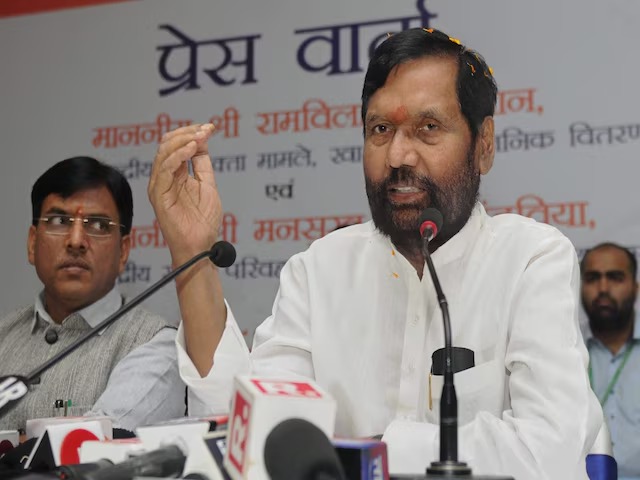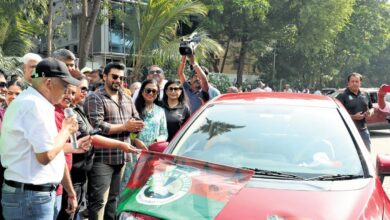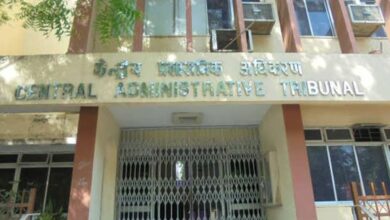Opinion | The Political Odyssey of Ram Vilas Paswan: Ideals Dimmed in the Light of Political Power
I gave a speech on the biography of Ram Vilas Paswan: The Weathervane of Indian Politics, which was released this week by Sobhana Nair. Having had the honor of getting to know Paswan firsthand, I was always amazed by his accessibility, humor, humility, and gregariousness. My very dear buddy Harivansh, the Deputy Chairman of the Rajya Sabha, inaugurated the book. Professor Manoj Jha, who is now an MP in the Rajya Sabha, was the other panelist and a close friend as well. Rashid Kidwai, who was always pleasant and competent, served as the moderator. Naturally, Sobhana was a member of the panel. Despite being billed as speakers, Chirag Paswan and Sushil Kumar Modi were noticeably—and maybe purposefully—absent.

After a stellar journalistic career, Sobhana is now The Hindu’s Deputy Editor. Her book on Paswan is quite interesting and contains a wealth of information from interviews with him and his peers, as well as stories. Political leader biographies sometimes degenerate into panegyrics or too analytical analyses, as I said in my observations, when a plethora of footnotes obscure the subject’s essence and personality. Thankfully, Sobhana has stayed clear of these two dangers.
A summary of Paswan’s life is necessary due to his extensive involvement in Indian politics for more than fifty years. He served as a member of the Central Cabinet for approximately thirty years, holding positions as an MP under six different prime ministers from different parties. Paswan also served as an MP in the Rajya Sabha for two terms and the Lok Sabha for nine terms. As a matter of fact, no comprehensive account of contemporary Indian politics would be complete without examining Paswan’s political astuteness, ideology, background, and way of thinking.
For her biography, Sobhana has selected a contentious subheading that refers to Paswan as the “weathervane of Indian politics.” She is correct to a large degree, but I did chuckle when I said that another politician in Bihar had long since surpassed him in terms of weathervane performance—he just switched parties for the nth time!
The colorful term used to describe Paswan as a “weathervane” by the legendary Lalu Prasad Yadav described him as a “mausam vaigyanik.” Lalu seemed to be implying that Paswan had the extraordinary capacity to foresee political events and consistently choose the victorious side. This was amply demonstrated in the recent past when he quit the UPA to join the BJP in 1999, during the PMship of Atal Bihari Vajpayee. He later left the BJP to join the Congress when the UPA came back to power in 2004, and he finally left the UPA in 2014 to ride the winning wave of BJP leader Narendra Modi.
The political assessment’s correctness is unlikely to find many parallels in the history of Indian democracy or any other democracy, given that Paswan made these strategic changes prior to the political party he joined winning the election.
Ideology was never a barrier in this success story, despite the fact that it played a major role in his choice to enter politics because of his personal past. Paswan, a Dalit, was born into poverty in a secluded Bihar hamlet encircled by six rivers, to which it was impossible to go for six months of the year. He would have to swim over two rivers to get to the local school. His first pair of shoes came while he was in the ninth grade. Nevertheless, he persisted in his studies, graduating and earning a law degree.
Ram Vilas was already accomplished when he ventured into the uncharted territory of politics; considering his background, being chosen to become a Deputy Superintendent of Police was an incredible accomplishment. His fundamental belief that the weakest and impoverished, particularly the Dalits, should have a voice in Indian politics is shown by the fact that he accepted the risk despite his reservations.
With very little funding, he ran for the Lok Sabha in 1969 as a candidate for the Samyukta Socialist Party. Remarkably, however, he defeated a well-known congressman and won with a margin that was entered into the Guinness Book of World Records.
It is also true, however, that Paswan gave up his long-term objective of establishing Bahujan politics as the vehicle for a pan-Dalit movement in favor of the quick appeal of political power. Although his ideological beliefs persisted till the very end, they became less prominent as he was drawn more and more into the vicious cycle of the Indian political system. Kanshi Ram was the mastermind of this kind of Bahujan endeavor. His intention to improve the lot of the Dalits and the most disadvantaged sections extended beyond the borders of Uttar Pradesh. He was the spokesperson for Bahujan empowerment, which made sense from a strictly statistical standpoint considering the number of India’s downtrodden sections. However, Mayawati, his own designated legatee, who shared Paswan’s desire for quick gains in political power, failed him in this long-term objective.
Paswan’s political career also serves as an example of the socialist movement’s ongoing failure. This movement showed promise in 1967, with the fall of Congress’s hegemony and the rise of renowned socialist figures like Ram Manohar Lohia. Among its most well-known faces were Paswan, Mulayam Singh Yadav, Lalu Prasad, Nitish Kumar, George Fernandes, Karpoori Thakur, and Charan Singh. But the socialist leaders’ conflicting personalities, internal strife, and ideological incoherence were innate flaws. The socialist movement of today is reduced to a shattered and weakening tool of the political establishment.
Despite his conventional political success, Paswan is unable to avoid this treachery. Following his premature passing, he left behind a split Lok Janshakti Party, with his younger brother Paras and son Chirag engaged in an internal conflict.







